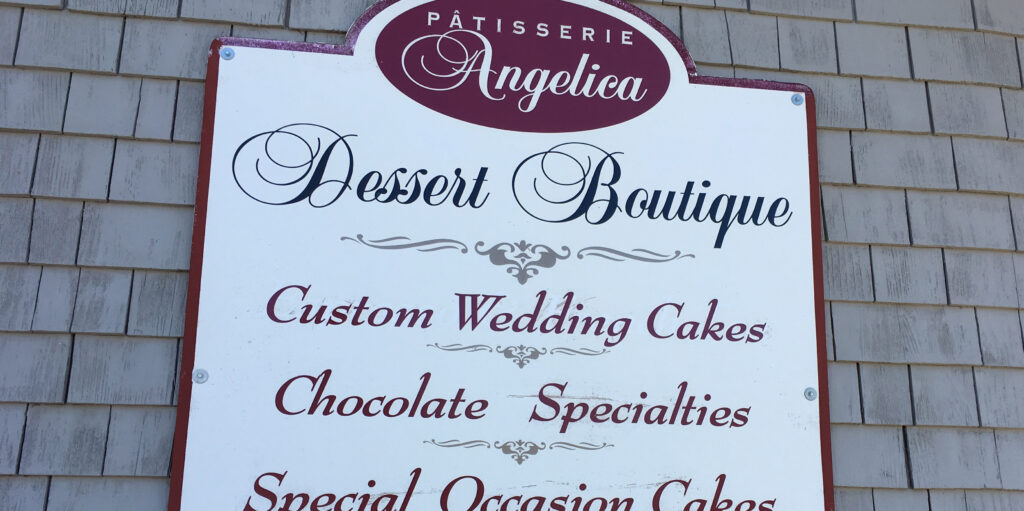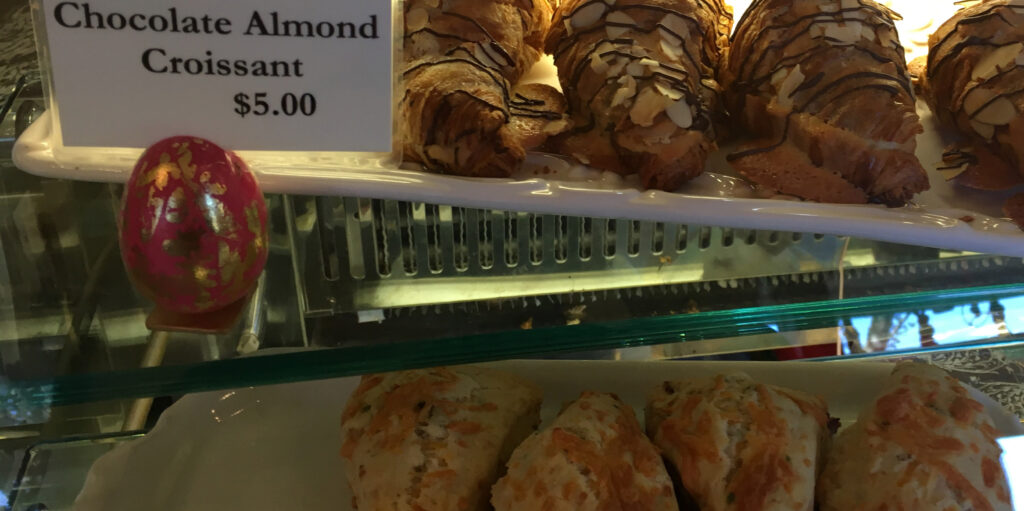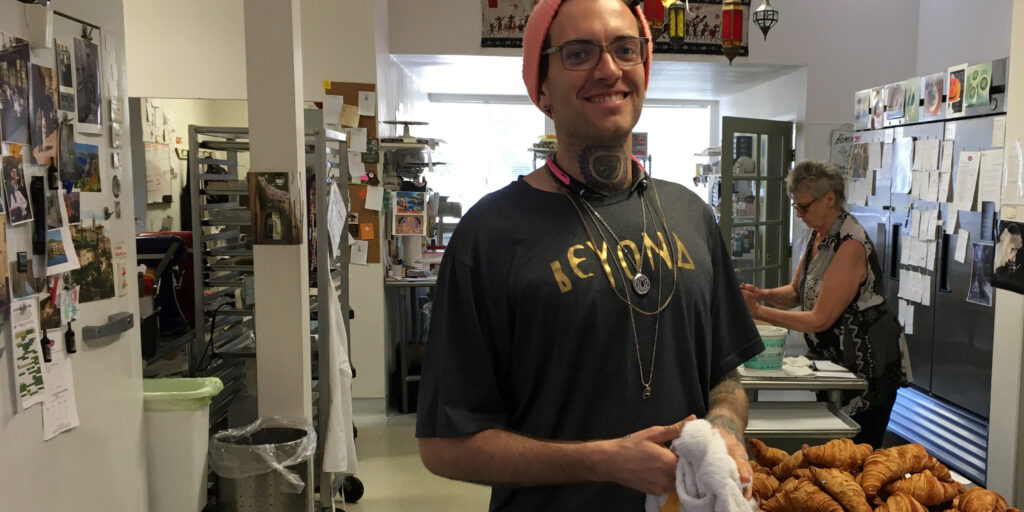
By Jonah Raskin
Condra Easley is the pastry chef. Her older sister, Debbie Morris, keeps the books, runs the front end of the house, and does the all-important decor for the popular fondant cakes. Together they have owned and operated Pâtisserie Angelica in Sonoma County for 24-years.
Now, the two sisters are selling their business, moving to the South of France and fulfilling a lifelong dream. After decades of hard work, demanding schedules and close community ties they’re looking forward to a change of pace and retirement.
The sisters and their pâtisserie were recently awarded a Snail of Approval from Slow Food in Sonoma County, a joint project of two chapters, Slow Food Sonoma County North and Slow Food Russian River.
Angelica is the first bakery in Sonoma County to receive a Snail of Approval for its adherence to the Slow Food values of “good, clear and fair.”

Pâtisserie Angelica is located at 6821 Laguna Park Way, near the heart of Sebastopol and in easy walking distance from shops and stores on Main Street and around the plaza. Open Thursday – Sunday, 10am-5pm.
For the first ten years Pâtisserie Angelica was located in Santa Rosa, and for the past fourteen years in Sebastopol, which the sisters have come to think of as home. They now live on the outskirts of Santa Rosa.
For years, Debbie served on the board of the Sebastopol Farmer’s Market and also on the steering committee for Cittaslow Sebastopol, the local chapter of the global organization whose mission it is to slow down the pace of urban living and encourage the preservation of local values.
“Sebastopol people really care about food,” Condra told me a few days before Easter, one of the busiest times of the year for the pâtisserie.
She added, “People here care what their kids eat. They also understand why we don’t use artificial flavors and colors and have no GMO products in our products.”
The word pâtisserie hardly needs translation, but for those unfamiliar with French, it means “pastry shop.”
Years ago, shops in France with a sign in the window that said, “pâtisserie,” meant that pastries were made in the traditional way. For croissants, that means the dough is folded again and again and again. It’s hard physical work.
Condra says that on her most recent visit to France (in 2018) she looked for the “pâtisserie” signs in shop windows and didn’t see them.
The vanished signs are signs of the times.
The pâtisserie is named after their mother Angelica who was a great baker the sisters remember fondly.
Pâtisserie Angelica sources local, organic, seasonal ingredients. The butter comes from Petaluma Creamery and the eggs from organic, pasture-raised chickens in Two Rock.
Angelica doesn’t use palm oil, though it’s the most widely used, inexpensive vegetable oil on the planet. In much of the tropical world, where rainforests are destroyed, palm trees are planted and cultivated in their place.
The environmental devastation has decimated much of the Orangutan population in Borneo.
“I’m a big fan of Orangutans,” Condra says.
She and Debbie are also big fans of the Earth itself. They compost, reuse, recycle, and waste little if anything in their shop.

The Snail of Approval certificate from Slow Food is displayed at the front counter of Pâtisserie Angelica. It means the world to Condra Easley and Debbie Morris who have lived and worked in accord with the philosophy and the principles of Slow Food.
Pastry and cake lovers—as well as fans of chocolate truffles, chocolate cakes and almond croissants—might visit the pâtisserie before Condra and Debbie hang up their aprons, pack their bags and begin a new life in France, around coming October.

Pâtisserie Angelica offers a wide array of pastries made in accord with French traditions and techniques that Condra learned in Paris from pastry masters. The pastries satisfy the sweetest of sweet teeth, but they’re not too sweet.
“When we retire,” Condra explained, “I hope people in Sonoma County will say, ‘Remember those two sisters!’”
Indeed, that seems likely.
Their pastry shop is legendary in Sonoma County food circles.
Locals come for the pâtisserie’s “high tea,” which is inspired by the English version, but transformed into what the sisters call “West County” style. That means that their “high tea” starts earlier in the day than it normally would in, say, London, or in Paris, where high tea might mean champagne, live music and a chef’s trolley loaded with more sweets than a human could eat in an afternoon.
Still, there are English-style cucumber sandwiches and warm cream current scones at Angelica. West county high tea is served Thursday to Sunday from 11 am to 3 pm. Reservations are necessary.
“We have high standards and we’re picky and demanding, but we’re not mean to our employees and we pay everyone a living wage,” Condra said. “When they work more than forty-hours a week they’re paid overtime.”
Maggie Cortez, the lead baker, trained at the Culinary Arts Department of Santa Rosa Junior College and worked previously at a shop that made only cupcakes.
“Maggie is the baker of all things wonderful,” Condra said.

Condra Easley was born and raised in Iowa. As a young woman, she went to France and worked in pâtisseries, often without pay. She has been making cakes and pasties in the U.S. for decades. A Francophile, she has a European sensibility.
There is no corn syrup at Pâtisserie Angelica and nothing much from far away, though Angelica imports unbaked croissants from Normandy, made with French butter that taste the way croissants are supposed to taste: billowy and buttery.
In the spacious kitchen at Angelica, the imported croissants are sliced open, dipped in simple syrup, filled with an almond-based cream and transformed into something new and different.
Christmas is the busiest time of the year for Angelica. Then comes Easter, followed by Valentine’s Day, when lovers want chocolate. Then there’s the Fourth of July when pies, made with peaches from Sonoma County’s Dry Creek, are one of the main attractions.
Condra doesn’t absolutely love pies, but she makes them with love and customers keep coming back for more.
June is big for weddings and that means wedding cakes. The pâtisserie also makes cakes for baby showers, corporate events, bar and bat mitzvahs and quinceañeras, celebrations of a girl’s fifteenth birthday, which are big in the Latino community.
The two sisters, who now seem inseparable, were born and raised in Iowa, where tasty, wholesome bread and genuine French pastries were difficult if not impossible to find.

As a young woman, Debbie Morris became a potter and worked in clay. Then she became a ski instructor in Aspen, Colorado, where she specialized in teaching women how to ski. She says that the training she provided helped to empower them.
As young women, they went separate ways. Debbie worked with clay as a potter and then became a ski instructor in Aspen, Colorado where she taught women how to navigate snow-covered slopes.
“I helped to empower them,” she said.
Condra worked in France as an apprentice baker. Her resume is two-pages long. Notably, she learned skills and techniques from Monsieur Pierre Hermé, who was awarded the title “Best Pastry Chef in the World” in 2016.
“He’s a real innovator,” Condra said. “I still look up to him.”
When she first arrived in Paris, Condra wrote to Hermé and explained that she wanted to learn the art of making pastries. When she phoned him, he told her to start the very next day.
“I was the only female in the kitchen,” Condra remembered. “I had to change from street clothing into whites in the broom closet. That was in 1986. I had been married with a husband. Now, I was young, single, free and in Paris.”
There’s still a “je ne sais quoi,” about her as the French might say.

The colorful tablecloth made in France, is a constant reminder to both Condra and Debbie that they’re on the brink of moving to France and settling there. It’s a longtime dream and it’s finally coming true.
At Monsieur’s Hermé shop, Condra kept her mouth shut and her eyes wide open.
“I was there to learn their way,” she explained. She made dough and turned it into tarts and puff pastries.
“I worked for free for sixteen-months,” she added.
Then she found a paying job at a place that only made brioches and where her employer didn’t speak a word of English. Her French was rudimentary.
She was also undocumented, and might have run afoul of the authorities for working without a permit.
Now, after all these years, she looks back at those days with a certain sense of nostalgia.
She’s also as much in love with France as ever.
“Yes, I’m a Francophile,” Condra said. “It’s pathetic. I think I was French in a previous life.”
When the sisters first came to Sebastopol from Santa Rosa, it seemed sleepy. But it grew on them, much as they grew on the town.
Debbie said, “We threw ourselves into the world of farmers markets and the farm-to-table-movement.”
Condra added, “There’s no point doing farm-to-table if you fall down on desserts.” Indeed, she’s made desserts a passion.
“We ‘ve had ups and downs,” Debbie said. “But having each other is the most amazing thing. I have enjoyed working with Condra’s creativity.

Alex, Condra’s 27-year-old son, works hard and plays an indispensible role at the pâtisserie. He carries on French traditions and techniques that his mother learned in Paris.
Some of Condra’s creativity rubbed off on her son Alex who was raised in the world of baking and who now works at the pâtisserie.
“I was in my baby basket and my mother would be making pastries,” Alex said. He’s definitely at home in a place that has brought genuine French pastry to Sonoma County, though he probably won’t continue as a baker when he moves to San Diego.
In retirement, Condra hopes to write her memoirs and include recipes. The working title is “The Pastry Apprentice in Paris.” Debbie plans to “poodle around” in her garden. The two sisters expect to visit UNESCO sites and Cittaslow Cities in Europe.
“It will be hard for someone to do what I’ve been doing at Pâtisserie Angelica,” Condra said. “But some things are attainable.” She added, “We’d love the space to continue to be a pâtisserie. ”
So would legions of loyal Sonoma County fans.
Pâtisserie Angelica 707-827-7998 • 6821 Laguna Park Way, Sebastopol, California 95472
Jonah Raskin is the author of Field Days: A Year of Farming, Eating and Drinking Wine in California, and a member of Slow Food Russian River’s Media Team. The photos are his.
He learned heaps from talking to Condra and Debbie. He left Pâtisserie Angelica with a beautiful chocolate cake and two croissants. He ate one of the croissants immediately. The other items made it home with him. He enjoyed them later in the day.
